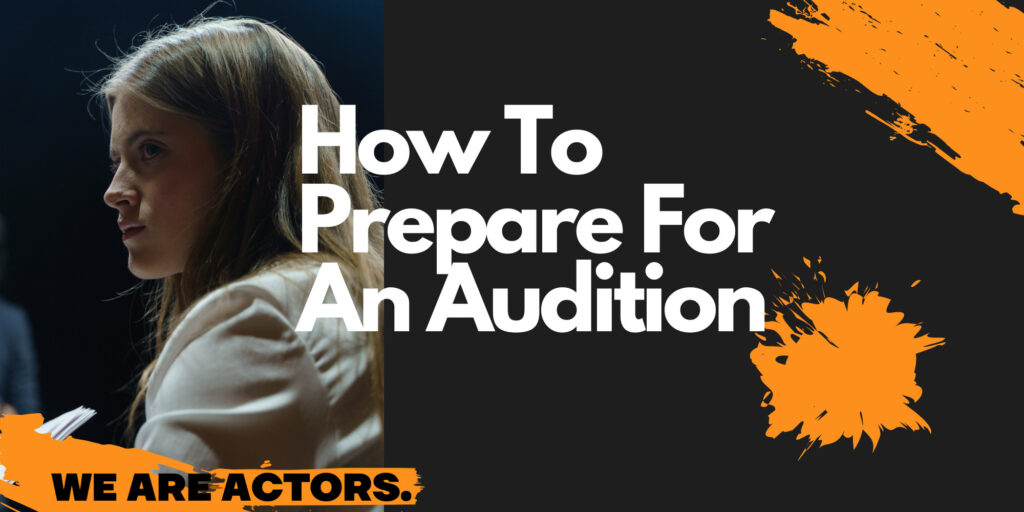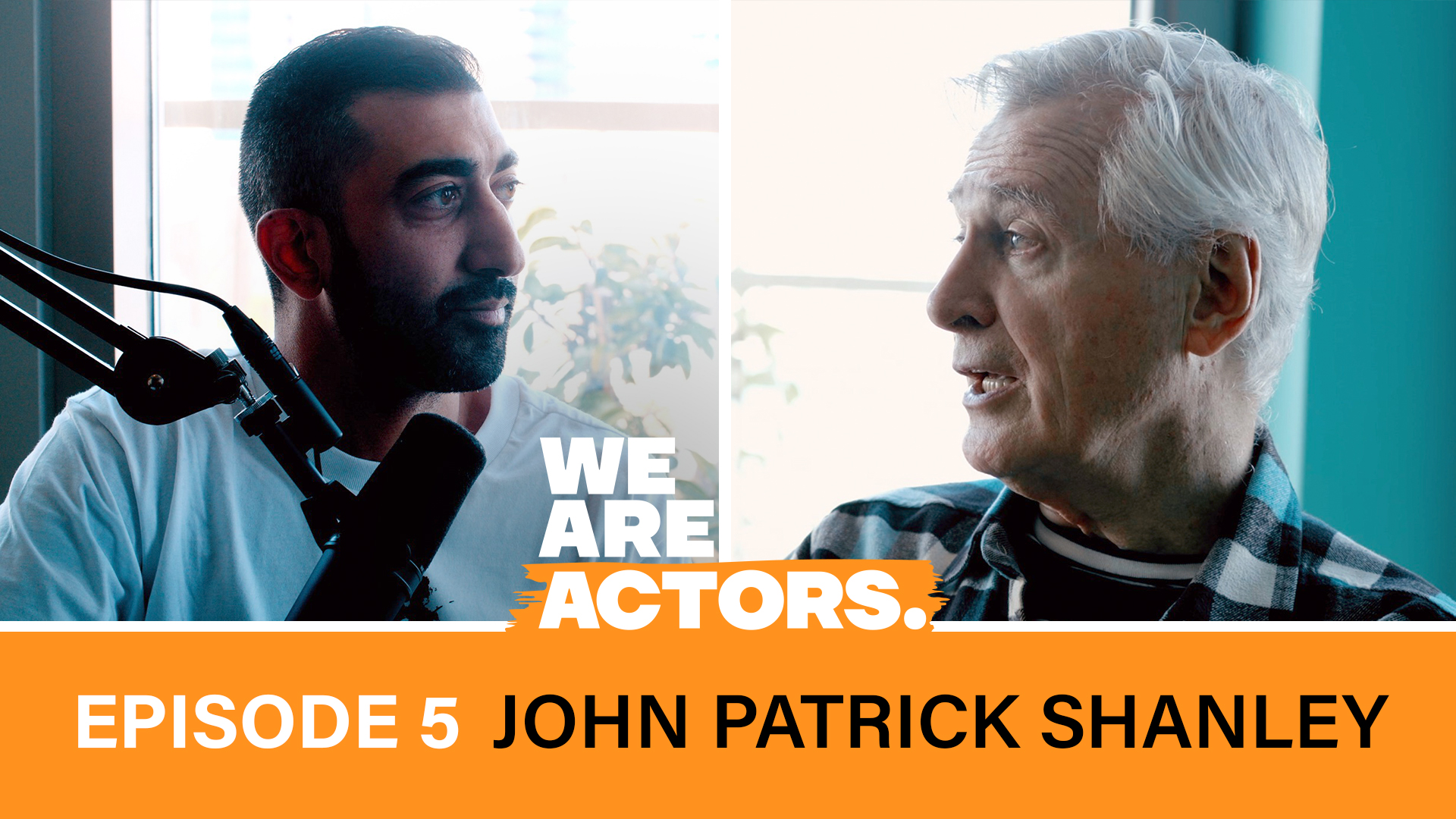
So, you’ve got an audition? First, don’t worry – every successful actor has been in your shoes, and you’re going to do just fine. Bryan Cranston, famous for his role as Walter White in Breaking Bad, once said that the purpose of an audition is not to get a job, but to present what you can do as an actor. It’s all about perspective, and it’s important to enjoy the process.
In this article we will go through all the aspects regarding how to prepare for an audition. In the highly competitive world of acting, every opportunity counts. Whether you’re a seasoned actor or this is just your first audition, the importance of thorough preparation cannot be overstated. It is through meticulous preparation that you can showcase your skills, stand out from the competition, and increase your chances of landing the coveted role. This article will provide you with a comprehensive guide to an effective audition preparation routine, ensuring you are fully equipped to perform at your best during each opportunity.
Importance of preparation
Preparation is vital for several reasons. First, it allows you to present yourself as a polished, professional actor, demonstrating your commitment and passion for the craft. Casting directors are more likely to consider actors who come prepared, as it shows they are dedicated to their work and can handle the demands of a role.
Second, proper preparation helps you build confidence in your abilities. Knowing that you have put in the necessary work to prepare for an audition can alleviate stress and anxiety, allowing you to focus on delivering a captivating performance.
Lastly, a well-prepared and memorized actor is more likely to be adaptable and open to direction. By fully understanding the character and their motivations, you can respond effectively to adjustments and demonstrate your versatility to the casting panel. Advice from casting is free always take it.
Overview of key aspects of an effective audition preparation routine
A comprehensive preparation routine consists of several key aspects, including pre-audition research, physical and vocal warm-ups, mental preparation, the audition itself, and post-audition reflection and follow-up. By addressing each of these areas, you can ensure that you are well-prepared for every aspect of the audition experience, ultimately maximizing your chances of success.
In this guide, we will delve deeper into each of these crucial aspects, providing you with practical tips and strategies to help you develop a winning audition preparation routine. By following this comprehensive approach, you will be well on your way to a successful and rewarding career in the world of acting.
Prepare For An Acting Audition
A successful audition begins long before you step into the room. Rehearsal is essential for demonstrating your professionalism, understanding of the character, and commitment to the project. In this section, we will discuss one crucial aspects of pre-audition preparation: researching the project
Research the project
Understand the role
Before you even consider which monologue or scene to perform, it’s essential to thoroughly research the role for which you are auditioning. Start by reading the script, paying close attention to the character’s backstory, relationships, motivations, and objectives. Understanding the character’s nuances will enable you to make informed choices about how to portray them, setting you apart from actors who rely solely on surface-level character traits.
Additionally, take note of the project’s genre, tone, and intended audience. These factors will influence your acting choices, helping you align your performance with the overall vision for the project.
Familiarize yourself with the director and production team
Another important aspect of research is familiarizing yourself with the director and production team. Learn about their past work, their creative style, and any preferences they may have for auditioning actors. This knowledge can provide valuable insight into what they might be looking for during auditions and can help you tailor your performance to appeal to their sensibilities. Researching the project is one of the best tips for auditioning.
You’re also going to want to get your things together. Have your digital or paper headshot and resume ready the night before. No one wants to deal with a printer that’s out of ink the morning of the audition, right?. Get your wardrobe together, clean, pressed, and ready to go. Consider including a set of backup clothes and shoes to keep in your car just in case of a spill, tear, or busted heel.
Here Are Some Audition Practice Scripts You May Enjoy!
Rehearse and Get Off Book
It is essential to memorize your lines. Knowing the lines is one of the most important steps to take in the preparation process. Tools like flashcards and repetition can help you memorize them. If you find it challenging, don’t be discouraged. It’s easier said than done, but with practice and perseverance, you will succeed.
Practice makes perfect, so start practicing as soon as you have the time to prepare. Find a quiet and comfortable place, stand in front of a mirror, and start delivering your lines. If you can, try to practice with a friend or family member. It’s important to get used to performing in front of others.
Physical and Vocal Warm-Ups
In addition to mental preparation and selecting appropriate material, it’s essential to incorporate physical and vocal warm-ups into your prep routine. Warming up helps to relax your body and mind, ensuring that you can deliver a focused and confident performance. In this section, we will discuss the importance of warming up, as well as specific exercises to get you ready for your audition.
Importance of warming up before an audition
Warming up is crucial for several reasons. First, it helps to prevent injury by loosening muscles and increasing blood flow throughout the body. Second, it improves overall performance by reducing tension and promoting relaxation, enabling you to connect more effectively with the character and the material. Finally, a well-rounded warm-up routine can help to calm nerves and build confidence, setting the stage for you to nail it.
Physical warm-up exercises
Stretching
Stretching is an essential component of any physical warm-up routine, as it helps to improve flexibility, release tension, and reduce the risk of injury. Focus on stretching key muscle groups, such as your neck, shoulders, back, and legs. Hold each stretch for 15-30 seconds, taking care not to overextend or bounce while stretching.
Breathing exercises
Breathing exercises are another vital aspect of a physical warm-up routine. Deep, controlled breathing can help to calm nerves, steady your heart rate, and improve focus. One effective breathing exercise is diaphragmatic breathing, also known as belly breathing. To practice this technique, place one hand on your chest and the other on your abdomen. Inhale deeply through your nose, allowing your abdomen to expand while keeping your chest still. Exhale slowly through your mouth, feeling your abdomen contract as you release the air.
Vocal warm-up exercises
Lip trills
Lip trills are a popular vocal warm-up exercise that helps to release tension in the lips, jaw, and face while also warming up the vocal cords. To perform a lip trill, place your lips loosely together and blow air gently through them, creating a buzzing sound. You can also practice lip trills while humming or singing scales to further warm up your vocal cords.
Tongue twisters
Tongue twisters are an excellent way to improve diction and articulation before an audition. Reciting tongue twisters at a slow, controlled pace can help to warm up the muscles in your mouth, making it easier to enunciate clearly during your performance. Gradually increase the speed at which you recite the tongue twisters, focusing on maintaining clarity and precision.
Vocal range exercises
Vocal range exercises are crucial for warming up the full extent of your vocal register. Singing scales, arpeggios, or other vocal exercises can help to gently stretch your vocal cords and ensure that you are comfortable using your full range during your audition.
By incorporating a comprehensive warm-up routine into your audition preparation, you will be better equipped to deliver a relaxed, confident, and engaging performance that leaves a lasting impression on the casting panel.
Mental Preparation
Mental preparation is a crucial component of a successful audition routine. By overcoming nerves, developing a positive mindset, and staying organized, you can maximize your chances of delivering an outstanding performance. In this section, we will explore various strategies for cultivating mental resilience and maintaining focus.
Overcoming audition nerves
Breathing techniques
Breathing techniques are an effective tool for managing audition nerves. Deep, controlled breaths can help to calm your nervous system, steady your heart rate, and improve focus. As discussed earlier, diaphragmatic breathing is an excellent exercise to practice in order to alleviate stress and anxiety.
Visualization exercises
Visualization exercises can also help to reduce audition nerves by allowing you to mentally rehearse a successful audition. Before you walk in, close your eyes and imagine yourself confidently walking into the audition room, delivering a strong performance, and receiving positive feedback from the casting. By visualizing success, you can prime your mind for a positive outcome and reduce anxiety.
Develop a positive mindset
Affirmations
Positive affirmations are a powerful tool for developing a positive mindset before you go. Repeating positive statements to yourself, such as “I am a talented actor” or “I am well-prepared for this audition,” can help to counteract self-doubt and reinforce confidence in your abilities.
Focusing on the process, not the outcome
Another strategy for cultivating a positive mindset is to focus on the process of auditioning rather than the outcome. By concentrating on giving your best performance and enjoying the experience, you can alleviate the pressure associated with booking the role and perform more freely and authentically.
Stay organized
Prepare a professional audition kit
Staying organized is an essential aspect of mental preparation, as it allows you to focus on your performance without being distracted by logistical concerns. One way to stay organized is to prepare a professional audition kit, which may include your headshot, resume, copies of your audition material, a water bottle, and any personal items you may need (such as a hairbrush or makeup for touch-ups). Having a well-stocked audition kit ensures that you have everything you need on hand, reducing stress and helping you feel more confident.
Arrive 15 Minutes Early To The Audition
Arriving early to your audition is another crucial aspect of staying organized. By allowing yourself ample time to check-in, warm up, and mentally prepare, you can avoid the stress of rushing and ensure that you are calm and focused when it’s time to perform.
By incorporating these mental preparation strategies into your audition routine, you can cultivate a positive mindset, overcome nerves, and maintain focus, ultimately increasing your chances of delivering a memorable and successful audition.
The Audition Process
In the actual audition, casting wants to see your personality shine. They want someone who can bring something unique to the role, someone who can tailor their performance to make the character come alive. So when you’re in the audition room, let yourself shine through. Make sure you’re connected with the reader and not just focused on delivering lines.
On the day is your opportunity to shine and demonstrate your talent, professionalism, and passion for the craft of acting. In order to maximize your chances of success, it’s essential to make a strong first impression, perform with intention, and be open to direction and collaboration. In this section, we will explore each of these key elements of the audition process.
Make a strong first impression
Dress appropriately
Your appearance plays a significant role in creating a strong first impression. Dressing appropriately for your audition shows respect for the casting panel and the project, as well as a commitment to your craft. Choose clothing that is clean, well-fitted, and reflects the character you are auditioning for without being too costume-like. Avoid overly distracting patterns or accessories, as they can detract from your performance.
Be confident and professional
Confidence and professionalism are crucial for creating a strong first impression. Greet the casting panel with a firm handshake, make eye contact, and introduce yourself clearly and confidently. Maintain a positive attitude, be respectful of everyone in the room, and demonstrate your enthusiasm for the project and the opportunity to work.
Perform with intention
Connect with the character
When performing your material, it’s essential to connect deeply with the character you are portraying. By fully understanding their backstory, motivations, and objectives, you can make informed acting choices that bring the character to life. Take a moment before you begin to ground yourself and connect with the character’s emotional state.
Engage with the reader or scene partner
During your performance, engage fully with the reader or your scene partner. Maintain eye contact, listen actively, and respond authentically to their cues. By being fully present and engaged, you demonstrate your ability to connect with others on stage or screen, which is a vital skill for any actor.
Take direction and be adaptable
Be open to adjustments
One of the most valuable traits an actor can possess is the ability to take direction and be adaptable. Casting directors often provide adjustments or feedback while in the room to see how well an actor can adjust their performance. Be open to their suggestions, and be willing to try new approaches without hesitation.
Show willingness to collaborate
Directors or casting are looking for actors who can collaborate effectively with the creative team and fellow actors. By being open to direction, demonstrating a positive attitude, and offering creative ideas when appropriate, you show that you are a team player and someone they would want to work with on their project.
By focusing on these key elements, you can make a strong impression on the casting panel, deliver a captivating performance, and increase your chances of landing the role.
Post Reflection and Follow-Up
Once you have completed the audition, it’s essential to reflect on your performance and maintain professional relationships with the casting panel and fellow actors. In this section, we will discuss the importance of post-audition reflection and follow-up, as well as strategies for making the most of these opportunities.
Assess your performance
Identify areas of improvement
After, take the time to honestly assess how you did. Consider aspects such as your preparation, focus, and execution of the material. Identify areas where you could improve and develop a plan for addressing these issues in future auditions. By continually seeking to grow and refine your craft, you demonstrate your commitment to acting and increase your chances of future success.
Celebrate successes
In addition to identifying areas for improvement, it’s important to acknowledge and celebrate your successes. Reflect on the aspects of your audition that went well, such as your emotional connection to the character or your ability to take direction. Recognizing your strengths can help to boost your confidence and reinforce the positive aspects of your audition experience.
Maintain professional relationships
Send a thank-you note to casting directors
Following your audition, it’s a good idea to send a brief thank-you note to the casting director and any other key decision-makers involved in the process. Express your gratitude for the opportunity to audition and reiterate your interest in the project. This simple gesture demonstrates your professionalism and can help to keep you in the casting director’s mind for future projects.
Network with other actors
Auditioning is also an excellent opportunity to network with fellow actors and forge connections within the industry. Introduce yourself to other actors in the waiting room, share contact information, and offer words of encouragement. By building a supportive network of industry peers, you can stay informed about upcoming opportunities and enhance your chances of success in the competitive world of acting.
By engaging in thoughtful post reflection and follow-up, you can learn valuable lessons from each experience, build strong professional relationships, and continue to grow and evolve as an actor.
A well-rounded prep routine is the key to success in the competitive world of acting. From researching the project and selecting appropriate material to engaging in physical and vocal warm-ups, mental preparation, and effective execution of the process, every step plays a vital role in delivering a captivating performance that leaves a lasting impression on the casting panel.
Here is a wonderful video that has a step by step guide on how to prepare for an audition.








